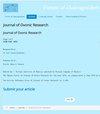利用 CNT 光栅结构提高 SiGe 薄膜太阳能电池的效率
IF 1
4区 材料科学
引用次数: 0
摘要
本文提出了一种使用碳纳米管(CNT)光栅层的硅锗薄膜太阳能电池新结构。使用碳纳米管光栅层可以减少表面的反射损耗,最大限度地提高电池活性层的光吸收。为了减少背面接触中的载流子重组,使用了 GaAs 背面场(BSF)层。仿真结果表明,拟议结构的效率为 29.32%。此外,我们还通过优化结构参数,包括光栅的深度和周期数,将效率提高到了 31.3%。本文章由计算机程序翻译,如有差异,请以英文原文为准。
Efficiency enhancement in SiGe thin film solar cell by a CNT grating structure
In this paper, a new structure of SiGe thin film solar cell using a carbon nanotubes (CNT) grating layer is proposed. CNT grating layer is used which reduces the reflection loss from the surface and maximizing optical absorption in the active layer of the cell. In order to reduce the carrier recombination in the back contact, a GaAs back-surface field (BSF) layer was used. The simulation results show that the efficiency of the proposed structure is 29.32%. Furthermore, we were able to increase the efficiency to 31.3% by optimizing the structural parameters including the depth and number of grating periods.
求助全文
通过发布文献求助,成功后即可免费获取论文全文。
去求助
来源期刊

Journal of Ovonic Research
Materials Science-Electronic, Optical and Magnetic Materials
CiteScore
1.60
自引率
20.00%
发文量
77
期刊介绍:
Journal of Ovonic Research (JOR) appears with six issues per year and is open to the reviews, papers, short communications and breakings news inserted as Short Notes, in the field of ovonic (mainly chalcogenide) materials for memories, smart materials based on ovonic materials (combinations of various elements including chalcogenides), materials with nano-structures based on various alloys, as well as semiconducting materials and alloys based on amorphous silicon, germanium, carbon in their various nanostructured forms, either simple or doped/alloyed with hydrogen, fluorine, chlorine and other elements of high interest for applications in electronics and optoelectronics. Papers on minerals with possible applications in electronics and optoelectronics are encouraged.
 求助内容:
求助内容: 应助结果提醒方式:
应助结果提醒方式:


